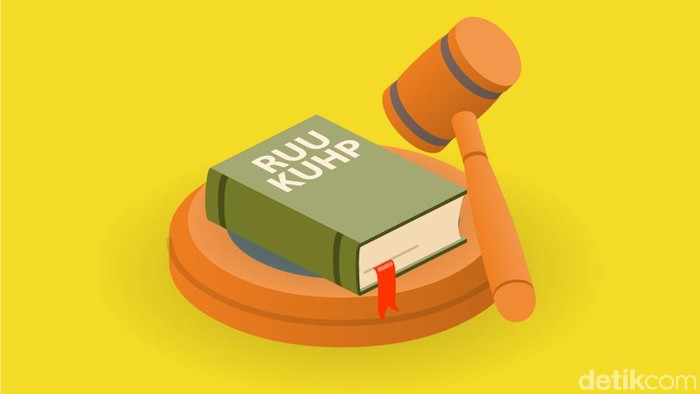By: Ayu Sri Mulyadi *)
The draft Criminal Code (RKUHP) is essentially an attempt by the government to renew or restructure the entire criminal law system contained in the old Criminal Code or Wetboek van Straftrecht (WvS) from the Dutch Colonial era.
This restructuring implies “rearranging” which aims to rearrange the building of the national criminal law system. Apart from that, the RKUHP has 4 (four) main missions, namely decolonization of the Dutch Colonial Criminal Code. Second, the democratization of criminal law which is marked by the inclusion of criminal acts against human rights (HAM), the elimination of criminal acts of sowing hostility or hatred which are formal criminal acts and reformulated as criminal acts of insult which are material criminal acts. Third, Consolidation of criminal law where the government rearranges the framework of criminal law principles in the Criminal Code. fourth,
The RKUHP itself should have been ratified in September 2019, but because several controversial articles were found, the ratification has been postponed until now and plans to be ratified before the end of 2022. There are many new provisions regulated in the RKUHP. To be precise, there are 10 things in the RKUHP that are considered important by the Professor of Criminal Law at the University of Indonesia (UI), Prof. Harkristuti Harkrisnowo, among others, does not distinguish between categories of crimes and violations, the principle of legality by acknowledging living law, the purpose of punishment, the type of punishment, the reasons for pardoning and aggravating crimes, judicial forgiveness (judicial pardon), alternatives to imprisonment, fines, additional punishments, and actions.
‘Kumham Goes to Campus’ is an event for the Ministry of Law and Human Rights (Kemenkumhan) to conduct outreach and public dialogue regarding the RKUHP among students. Udayana University, Bali is the last location for the ‘Kumham Goes to Campus’ program which aims to have dialogue with students and young people. Eddy Hiariej admitted that he received a lot of input from Udaya University students, including written input which would be taken into consideration at a discussion meeting regarding the RKUHP at the DPR RI.
He continued, Deputy Minister of Law and Human Rights (Wamenkumham), Edward Omar Sharif Hiariej emphasized that there were 3 (three) main reasons why the RKUHP was important and urgent to be ratified. First, the Criminal Code that is currently being used is said to be in the era of the classic criminal law school so that the criminal law is used solely as a means of revenge or ‘lex salionis’ (an eye for an eye). Second, the current Criminal Code is “out of date” which is no longer relevant to the all-digital 4.0 era. Finally, the different translations and interpretations of the Criminal Code among experts, including by the National Legal Development Agency. Thus, it is hoped that the new Criminal Code will not only be oriented towards modern criminal law but will also be adapted to the times.
Bureaucracy Observer who also serves as Executive Director of the Indonesian Bureaucracy and Service Watch (IBSW), Nova Andika hopes that the government will continue to carry out public dialogue and outreach to absorb people’s aspirations for the RKUHP. This is intended so that the community understands more and is involved in providing input before the RKUHP is passed into law (UU). Nova also appreciates the government’s seriousness in this matter, namely the Ministry of Law and Human Rights (Kemenkumham) which involved the community in drafting the RKUHP by regularly holding public dialogues and outreach in a number of areas for the sake of perfection of the RKUHP, especially discussing several articles that have caused debate and polemic in society.
IBSW has noted that this public dialogue has been carried out in 11 cities including Medan, Padang, Bandung, Denpasar, Surabaya, Pontianak, Samarinda, Makassar, Manado, Ternate and Sorong. As a result, the government has succeeded in absorbing 53 input items from the public. So, this process of public dialogue is not merely a preamble for imagery but is indeed carried out in order to achieve the perfection of a just criminal law for all elements of society. This public dialogue agenda was also carried out in the context of carrying out President Joko Widodo’s directives which asked the Kemenkumham staff to absorb and accommodate people’s aspirations by re-demonstrating.
Based on these inputs, Eddy Hiariej stated that there had been a change in the number of articles in the RKUHP to 627 articles, which initially had 632 articles. The five articles deleted were related to fraudulent advocates, practicing doctors and dentists, homeless people, poultry and livestock, as well as forestry and environmental crimes. He added that the 5 (five) deleted articles were input from several academics including from the Ministry of Environment and Forestry (KLHK). The inputs from the community are grouped into 4 (four) categories, namely deletion, such as the 5 (five) articles that have been deleted, reformulation, additions, and repositioning.
The reformulation included the addition of the word ‘belief’ in the articles that regulate religious matters. Then, changing the phrase ‘legitimate government’ to ‘government’ and changing the explanation of article 218 regarding attacks on the dignity of the President and Vice President. Furthermore, in the additional category, the RKUHP drafting team added one article related to the affirmation of several crimes of sexual violence. As for the repositioning category, the RKUHP repositions 3 (three) articles regarding the crime of money laundering into 2 (two) articles without any changes in substance. If all criticisms and input related to the RKUHP have been fulfilled, then the DPR RI can ratify it.
*) The author is a contributor to Nusa Bangsa Institute.
